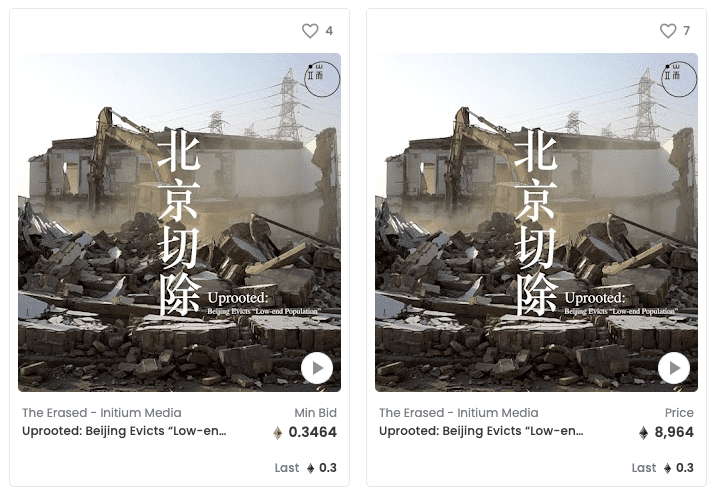Initium Media, a respected Chinese-language news site with roots in Hong Kong, has sold out its first collection of non-fungible tokens (NFTs), featuring news events the news organization believed to have a significant impact, as news media increasingly embrace NFTs as a new form of storytelling.
Recently relocating its headquarters from Hong Kong to Singapore, Initium Media, or “端傳媒” in Chinese, on Wednesday issued its first NFT collection called “The Erased,” which told stories of the migrant workers in Beijing who got evicted in 2017 as part of the city’s “low-end population” evacuation campaign.
The three NFTs, listed on OpenSea, were sold out within the day, with each sold for 0.3 ETH (US$1,049).
In addition to featuring Beijing migrant workers, the news outlet plans to roll out more NFTs telling stories of Dr. Li Wenliang, the whistleblower who warned of the coronavirus outbreak in Wuhan and later died from Covid-19, as well as the political storm that has cast a shadow over the ill-fated Hong Kong media landscape, according to a statement it released on Tuesday.
Initium Media isn’t the first news outlet with major operations in Hong Kong to roll out NFTs. In July, the South China Morning Post (SCMP), a 118-year-old English-language newspaper in the city, announced the launch of ARTIFACT and its litepaper — a shortened version of a white paper — for a standardized metadata structure for recording snippets of history as NFTs that could be tradeable in a marketplace.
As political tensions continue to loom over the former British colony, some have been taking action to preserve Hong Kong’s cultural history. For instance, Taiwan-based NFT marketplace Lootex in July held a sale of NFTs of the first volume of “Buddha’s Palm,” a famous Hong Kong manga series first published in the 1980s.
Some Hong Kong activists also share the idea of using blockchain to preserve news media content. When Hong Kong’s Apple Daily, the city’s biggest-circulation pro-democracy newspaper, was forced by the government to shut down in June, a 21-year-old local developer started a “dAppleDaily” project to “decentralize Apple Daily” by scraping content from the paper’s website and putting it on Arweave, a decentralized data storage platform.
Susie Wu, executive editor of Initium Media, told Forkast.News in an interview that as many historical moments would be easily forgotten in the fast-paced society, NFTs could serve as a great way to record monumental moments of the age.
“One core thing about NFTs is its attribute of preserving content,” Wu said. “By telling stories of a news event in the form of NFT displays, we hope to remind readers that some things should not be easily forgotten.”
Meanwhile, Initium started to accept cryptocurrencies — including Bitcoin, Ethereum, Litecoin, Bitcoin Cash, DAI, USDC and Dogecoin — as payments for its news content subscription.
“We’re exploring more possibilities for our business model with NFTs and cryptocurrency,” Yung Hsin Chang, head of audience development for Initium, told Forkast.News. “This could be one direction for media companies to seek for more revenues in addition to traditional advertising and paid subscription.”
Chang said that the Initium team was hoping to reach a greater audience by offering crypto payment options and NFT collections. “Some readers have reached out to us before, hoping to make payments anonymously due to transaction privacy concerns.”
Gary Liu, CEO of the SCMP, shared similar views. “The NFT, and this marketplace that we’re building, is able to create a revenue channel that allows us to properly monetize our archives, express the value of our archives, and find the collectors around the world that are willing to effectively fund a newsroom through owning parts of our archives,” Liu told Forkast.News in an August interview.
“Blockchain allows us to [make] the process of how a story came to be fully transparent,” Liu said. “The NFT project itself is a first step to taking what has already been published in history and being able to make it more transparent to the rest of the world.”
See related article: Can blockchain protect journalism and push back against censorship?

